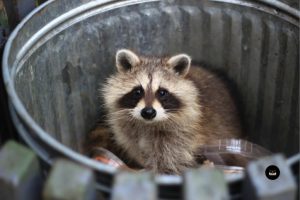Imagine a home where you can rest easy, knowing that clever raccoons won’t be making unexpected visits. At Birdman Wildlife Removal Services, we understand the frustration and anxiety that come with recurring raccoon problems. Our expert team not only removes these persistent intruders but also fortifies your home against future invasions. Let us help you reclaim your peace of mind and create a raccoon-proof sanctuary for your family.
Understanding Raccoon Behavior and Attraction Factors
To effectively prevent future raccoon intrusions, it’s crucial to understand what attracts these intelligent creatures to your property:
- Easy access to food sources (garbage, pet food, bird feeders)
- Shelter opportunities (attics, chimneys, crawl spaces)
- Water sources (ponds, birdbaths, leaky faucets)
- Nearby wooded areas or green spaces
Raccoons are adaptable and opportunistic, so eliminating these attractants is key to long-term prevention.
Comprehensive Home Inspection
A thorough inspection of your property is the first step in raccoon-proofing:
- Examine the roof, including shingles, soffits, and fascia boards
- Check all vents, chimneys, and utility entry points
- Inspect the foundation for cracks or gaps
- Look for loose or damaged siding
- Assess windows and doors for proper sealing
Identifying all potential entry points allows for targeted prevention measures.
Effective Sealing and Exclusion Techniques
Once vulnerabilities are identified, it’s time to seal them off:
- Use heavy-gauge steel mesh to cover vents and gaps
- Install chimney caps and roof vent guards
- Repair or replace damaged shingles and siding
- Seal foundation cracks with durable materials like concrete or expandable foam
- Reinforce weak spots in eaves and overhangs
Professional-grade materials and proper installation are crucial for long-lasting protection.
Landscaping and Property Management
Smart landscaping can significantly reduce raccoon attractiveness:
- Trim tree branches that provide easy roof access
- Remove brush piles and dense vegetation near the house
- Keep lawns well-maintained to reduce grub populations
- Consider installing motion-activated sprinklers in problem areas
A well-maintained yard not only deters raccoons but also enhances your property’s overall appeal.
Smart Waste Management Practices
Proper garbage handling is essential in raccoon prevention:
- Use sturdy, animal-proof garbage cans with tight-fitting lids
- Secure lids with bungee cords or locks if necessary
- Store garbage cans in a garage or shed until collection day
- Clean bins regularly to minimize odors
- Consider using ammonia-soaked rags in garbage areas as a deterrent
By making your trash inaccessible, you remove a primary raccoon attractant.
Using Deterrents and Repellents Effectively
While not foolproof, deterrents can supplement other prevention methods:
- Install motion-activated lights in key areas
- Use ultrasonic devices designed to repel wildlife
- Apply taste repellents to garbage cans and potential food sources
- Consider using predator urine products around the perimeter of your property
Remember that deterrents often have limited effectiveness and should be used in conjunction with other prevention strategies.
The Importance of Ongoing Monitoring and Maintenance
Raccoon prevention is an ongoing process:
- Conduct regular inspections of your property, especially after severe weather
- Promptly repair any new damage or vulnerabilities
- Update prevention methods as needed based on changing raccoon behavior
- Stay informed about local raccoon activity and adjust strategies accordingly
Vigilance and adaptability are key to long-term raccoon prevention success.
By implementing these comprehensive prevention strategies, you can significantly reduce the likelihood of future raccoon intrusions. At Birdman Wildlife Removal Services, we’re committed to helping you create a raccoon-proof environment that provides lasting peace of mind. Our expert team will work with you to develop a customized prevention plan tailored to your property’s unique needs, ensuring that your home remains a safe and comfortable sanctuary for you and your family.
FAQs
What smells do raccoons hate?
Raccoons have a strong sense of smell and dislike certain odors. Some scents that may deter raccoons include:
- Ammonia
- Garlic
- Hot peppers or capsaicin
- Peppermint oil
- Onions
- Epsom salts
While these smells may help deter raccoons temporarily, they are not a long-term solution and should be used in conjunction with other prevention methods.
How do I raccoon-proof my garbage cans?
To raccoon-proof your garbage cans:
- Use metal cans with tight-fitting lids
- Secure lids with bungee cords or locks
- Store cans in a secure location like a garage or shed until collection day
- Clean bins regularly to minimize odors
- Consider using ammonia-soaked rags in garbage areas as an additional deterrent
- Use raccoon-resistant straps or weights on top of the lids.
Can raccoons climb walls to get into attics?
Yes, raccoons are excellent climbers and can scale walls, downspouts, and even brick exteriors to access attics. They can also use nearby trees or structures as “bridges” to reach rooftops. To prevent this:
- Trim tree branches away from your roof
- Install metal sheeting or spikes on downspouts and corners of your home
- Seal all potential entry points in your roof and eaves
- Use motion-activated lights or sprinklers to deter climbing raccoons
Remember, professional wildlife removal services are often the safest and most effective way to deal with persistent raccoon problems.

